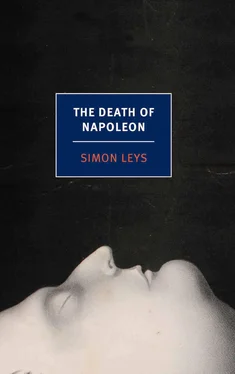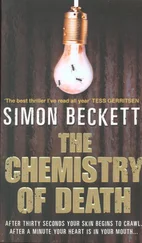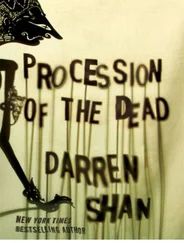IN THE DAYS THAT FOLLOWED, the full horror of his new situation became clearer still.
In a Europe which could not find a single adversary worthy of opposing him, the dismemberment of states, the carving up of empires, the dethronement of kings were hardly challenges to him… But now an obscure noncommissioned officer, simply by dying like a fool on a deserted rock at the other end of the world, had managed to confront him with the most formidable and unexpected rival imaginable: himself! Worse still, from now on Napoleon would have to make his way not only against Napoleon, but against a Napoleon who was larger than life — the memory of Napoleon!
As the medical officer, who had been only too happy to find someone to share the dull emptiness of his days, took him on his rounds of the faithful during the following week, he was in a better position to gauge the full extent of the disaster. Those old soldiers, the stoical officers on half-pay, the rank and file, sustained by an unshakable hope, had spent the last six years waiting for the Emperor’s return, and would have risen up in a body at the first call. Now, at one stroke, his passing away had demobilized all those humble foot soldiers of the imperial cause, every one of them.
Now that it had been dissipated, how could all that immense energy be harnessed again? The degree of prostration felt by the faithful was all the greater because they had made such superhuman efforts to survive all those years without wavering in their resolution. And today, perhaps this sudden extinction of all their reasons to hope and believe even brought them a certain grim sense of relief… They enjoyed their despair: they sank into it with a kind of relish, as one voluptuously sinks into sleep after a very long vigil. If anyone had tried to wake them at that time, he would have found them not only deaf but hostile as well. Relieved from the rigors of guard duty, released from the double burden of loyalty and hope, free at last, they drifted among memories. Now that they had succumbed to the poison of nostalgia, they wallowed in the past; who could ever persuade them to become once again those galley slaves of glory, chained together by a common dream that was perhaps an illusion?
And who would ever recognize him, now that there was no longer anyone to wait for him? The transformation brought about by age and the indignity of his disguise, which a few days earlier had not been sufficient to screen him from the eyes of a true believer, would from now on stand as a barrier between himself and his followers. Should he wear himself out in an effort to convince them and win them back again one by one, and then endlessly try to patch up the cracks in their crumbling support — should he eternally devote himself to propping up the irreparably damaged structure of their faith, when all he had was his presence and his words? He felt his strength fail him at the thought of the enormous task that awaited him.
… At the same time, he itched to see action again. His situation as the Ostrich’s temporary boarder became more delicate day by day. To justify it, he would have to reveal his true identity, and that was something he could not do. It was both too early and too late to play his only card. Any premature attempt to impose upon his simple companions a truth that they were no longer equipped to bear, that they were not yet ready to bear, could condemn him to failure and intolerable derision. He was well aware of that. He worried and fretted in his useless refuge: the more urgent the need to act, the clearer it became that action was impossible.
It was then that a fresh delivery of watermelons and cantaloupes from Avignon suddenly changed the course of his fate.
The sweet-smelling freight — there were two cartloads of it — had been spread out on the tiled floor of the big room. For some days, the Ostrich, helped by the gang of children and a few ex-soldiers from Les Trois Boules, had been in a flurry of activity, trying to retail this merchandise along the streets. The little band went out at dawn and returned late at night, exhausted and demoralized. Sales were poor, the pile of cantaloupes that occupied three-quarters of the room didn’t seem to get any smaller. And, like a sinister portent, here and there a cantaloupe was already beginning to go soft.
One afternoon, as Napoleon was gloomily turning over his thoughts while walking up and down the room — or at any rate the narrow space that had remained unencumbered — he accidentally trod on a watermelon, slid, and lurched wildly.
He nearly sprained his ankle. The melon squashed open, spreading its juicy entrails across the tiles and releasing an odor of rotting fruit.
As he stood, staring dumbly at the sticky mess that had spurted out onto this boot, he was suddenly overcome by a surge of fury. The oppressive smell of the melons, the insistent buzzing of the flies, the frantic, well-meaning efforts of the Ostrich and her inept assistants — the reality of everything that he had hitherto registered only passively, suddenly hit him in the face like an insult; he was no longer the cold and detached spectator of this mediocre farce; thrown out of his illusory box seat, he was horrified to discover that the pitiful hero of the piece was none other than himself. For the first time, he began to see himself as he really was, naked and defenseless at the center of a universal debacle, buffeted this way and that by events, threatened on every side by an all-pervasive decay, sinking slowly into the quicksands of failed resolutions, and finally disappearing into the ultimate morass against which no honor could prevail. He suddenly lost his self-control; in an explosion of rage and revolt, he grabbed the burst watermelon and hurled it at the wall. It squashed there and formed a star which slowly began to dribble down…
… Like the sky which is cleansed by a storm, he found himself wonderfully purged by this sudden outburst. He was already beginning to see in a different light the wretched melon that only a moment before had set his morbid train of thought in motion: his mind had just hit on a new inspiration.
That evening, when the Ostrich and her troop came back to the house, they were all struck by the sudden change in him. They were in the presence of another man entirely: in the place of yesterday’s self-effacing boarder, they found a leader.
He addressed them briefly. His words were clear and simple, with a ring of authority that electrified them. He pointed out that the stock of overripe melons was their only capital, perhaps the last card in their hand; that they could not afford to play it haphazardly, as they had been doing up till now, in an effort that was most certainly brave but confused and futile; that, on the contrary, it was imperative to prepare their plan of action thoughtfully, with painstaking attention to detail, so that they could then concentrate all their energy in one decisive move, carried out at the most opportune time and place.
Instinctively he recovered the language of the army leader speaking to his generals on the eve of battle, and those grave but powerful tones immediately struck a chord in his audience. They spontaneously invited him to take command of operations, and asked him to explain his plan in detail.
He asked for a Paris street map and spread it out on the table. The Ostrich lit some extra candles. The whole troop sat in a circle around the table. Only Napoleon remained standing. After a long, hard look at the map, he walked up and down the room for a few minutes, his hands behind his back. No one dared to break the silence. In the candlelight his short silhouette cast shadows to the four corners of the wall, shadows that seemed to leap from a giant spring. Finally, after sending a stray pumpkin sailing into the air with a short sharp kick, he turned around on the spot, and like an eagle diving on its prey, he came back to the table and in front of his troops outlined the following strategy:
Читать дальше












